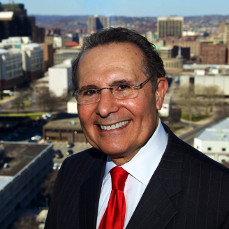The Proposal: a safety and crime proposal
Title: A constitutional curfew for juveniles
From: From Republican mayoral candidate Steve Kimatian
Type: Press release
Location: News conference at the Northeast Community Center
Date: Aug. 25, 2009
SUMMARY: In a press release, Kimatian calls for a citywide curfew, beginning at 11 p.m., in Syracuse for those 16 and younger. The curfew would exempt young people traveling to or from work to their jobs or those in the company of their parents or legal guardians. Kimatian also calls for counseling and other services for curfew violators. He maintains his curfew would be crafted so that it is constitutional and would not be opposed by the courts. In August, Kimatian was running for the GOP nomination for mayor. In the Sept. 15 primary, he won and is the Republican candidate for the Nov. 3 election.
What He Says:
The key statement: “My Curfew Intervention Law will adhere to principles embraced in the state Family Court Act, as opposed to State Penal Law,” Kimatian said. “As such, I anticipate there will be no constitutional issues.”
The Facts:
“I anticipate there will be no constitutional issues.”
Juvenile curfews have a mixed track record with constitutionality. In the past decade, eight New York cities and towns enacted juvenile curfews that are still in force. Seven others considered but rejected curfew proposals because of public opposition and concerns about their constitutionality. One — in Rochester — has been struck down by courts as unconstitutional. The American Civil Liberties Union often opposes curfews and recently won the Rochester case. It’s curfew, enacted in 2006, was ruled unconstitutional by the New York Court of Appeals. Michael Burger, a lawyer on the case, says that such curfews violate teenagers’ right of free movement, their freedom of religion, freedom to remain silent and freedom of association. These curfews, he said, also interfere with parental supervision and control over the upbringing of their children. Kimatian has compared his proposed version of a juvenile curfew to that in effect in Buffalo since 1993. It survived potential constitutional challenges because it was crafted under Family Court law, as Kimatian says he would do. But he has not been specific about how his curfew would follow that of Buffalo.
Conclusion:
Despite Kimatian’s anticipation, curfews are often challenged on constitutional grounds. Many cities or towns that have contemplated passing curfews,have been influenced by courts’ decisions to repeal curfew laws. As a result, not many cities or towns have curfew laws. Kimatian’s curfew law would likely also face court challenges, according to Burger of the American Civil Liberties Union.
(Silvia Milanova is a senior in newspaper journalism and nutrition.)
-30-



